Key takeaways:
- Pro-life advocacy emphasizes the value of every life and the need for comprehensive support systems for mothers and families.
- Restrictive laws can cause emotional and practical challenges, isolating families and impacting their access to essential resources.
- Building authentic relationships and understanding the audience are crucial strategies for effective advocacy.
- Future pro-life initiatives should focus on legislative advocacy, education, and partnerships to empower women and foster community support.
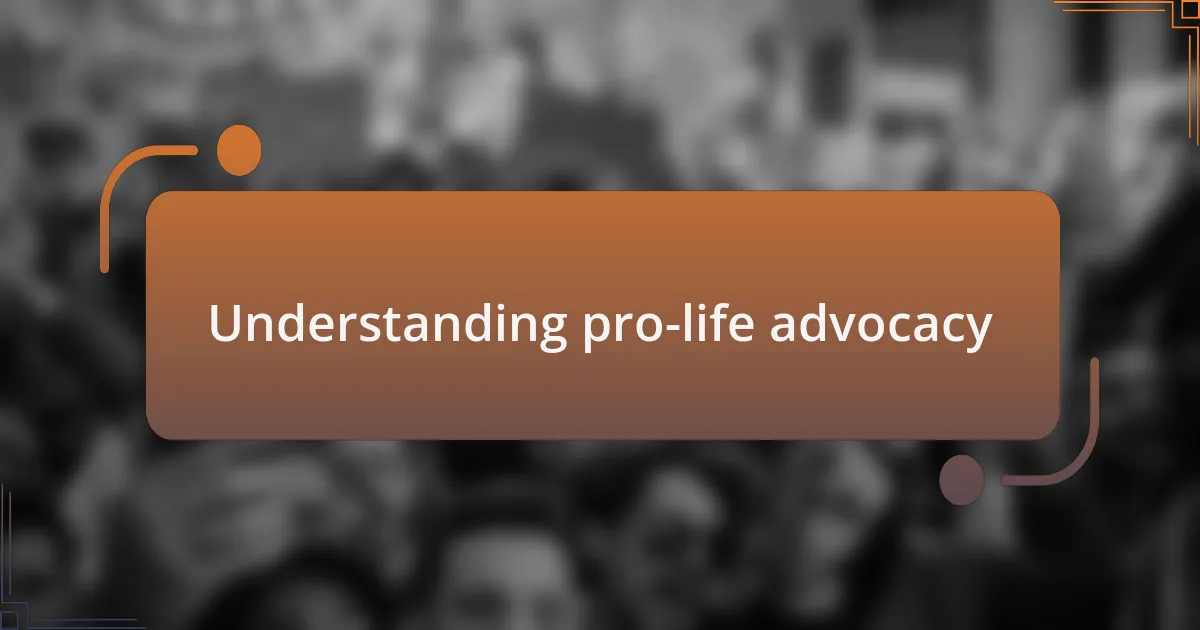
Understanding pro-life advocacy
Pro-life advocacy is fundamentally rooted in the belief that every life, from conception onward, has inherent value. Reflecting on my journey, I often recall a moment when I witnessed a young mother grappling with an unplanned pregnancy. Her struggle highlighted the urgency and importance of our advocacy, as I realized how crucial support and compassion can be in these challenging situations.
The movement embodies more than just opposition to abortion; it emphasizes the need for comprehensive support systems for mothers, babies, and families. I recall participating in a community event where we shared resources on parenting and financial assistance. It was enlightening to see how proactive engagement can fundamentally change lives, and it makes me wonder: what barriers could we break down if more people fully understood the depth of pro-life advocacy?
At its core, pro-life advocacy is about fostering a culture that cherishes every individual’s right to life and support for those facing difficult circumstances. During conversations with friends who are unaware of the complexities involved, I often ask them, “Have you ever thought about the emotional and physical challenges faced by women in crisis situations?” It’s these discussions that illuminate the diverse perspectives within this advocacy, revealing the importance of empathy and understanding in our collective mission.
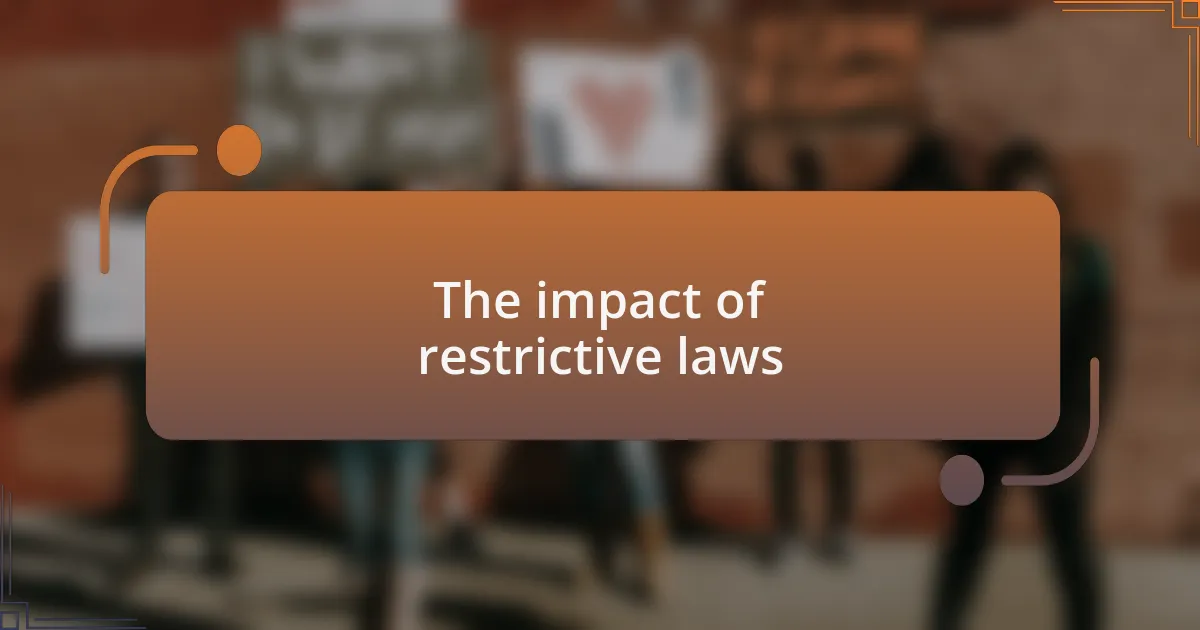
The impact of restrictive laws
Restrictive laws can have profound effects on families and communities. I remember speaking with a young couple who were devastated by new legal limitations impacting their ability to access necessary healthcare. It struck me how a singular law could shatter their hopes and dreams, making me question: how do we measure the costs of lost potential?
Moreover, the emotional toll of these laws often goes unnoticed. I encountered someone who felt trapped by bureaucratic hurdles, leading to anxiety and isolation. This brings to light the question: should our legal systems prioritize punitive measures over compassionate care?
Finally, it’s important to consider the ripple effect restrictive laws can have on support networks. Families often find themselves dealing with stigma and lack of resources, further isolating those in need. Reflecting on my experiences, I can’t help but wonder: what more can we do to foster a community that empowers rather than restricts?
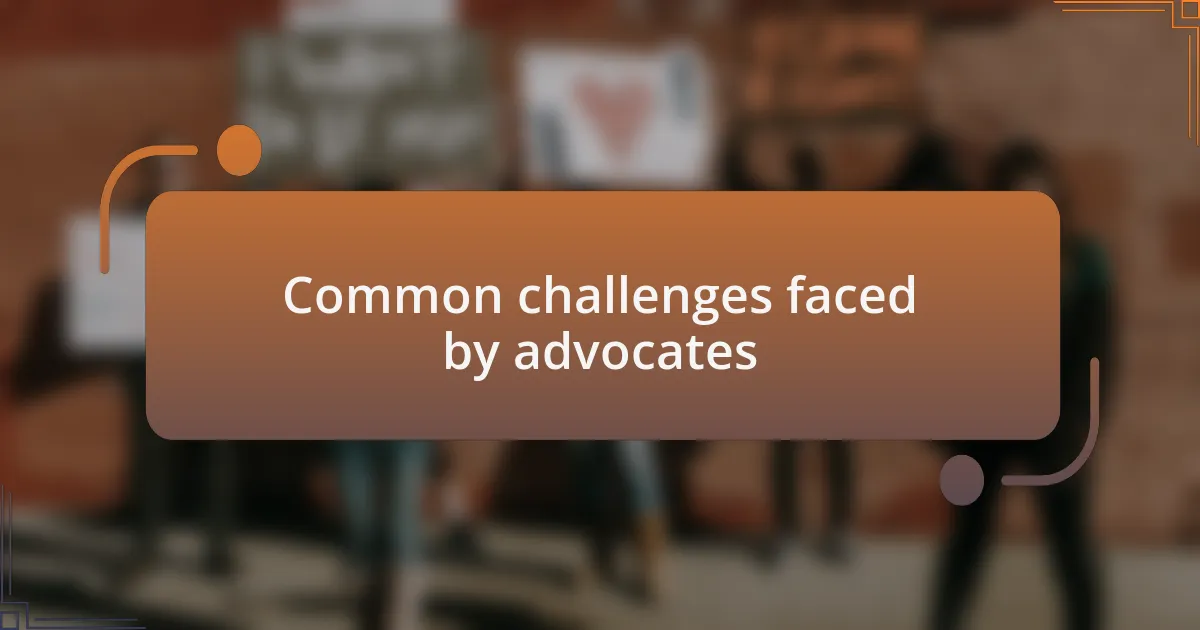
Common challenges faced by advocates
Advocates often encounter significant resistance, both from policymakers and the public, when promoting pro-life values. I can recall attending a community meeting where passionate discussions took an antagonistic turn, leaving many advocates feeling discouraged and unheard. It made me wonder: how can we effectively bridge the gap between differing viewpoints to achieve a common understanding?
Beyond the political landscape, personal attacks and stigma can severely affect an advocate’s morale. In one instance, I shared my views online, only to face a barrage of harsh comments that left me questioning my commitment. This experience drove home the point that resilience is vital; if I let negativity silence me, who would stand up for those who can’t?
Another challenge is resource allocation—advocates often work with limited funding and support, impacting outreach efforts. I recall organizing an event that fell short of our goals, leaving me feeling defeated. Yet, these moments taught me the importance of creativity and collaboration, propelling me to seek partnerships that could amplify our voices and extend our reach. How do we convert constraints into opportunities for growth and connection?
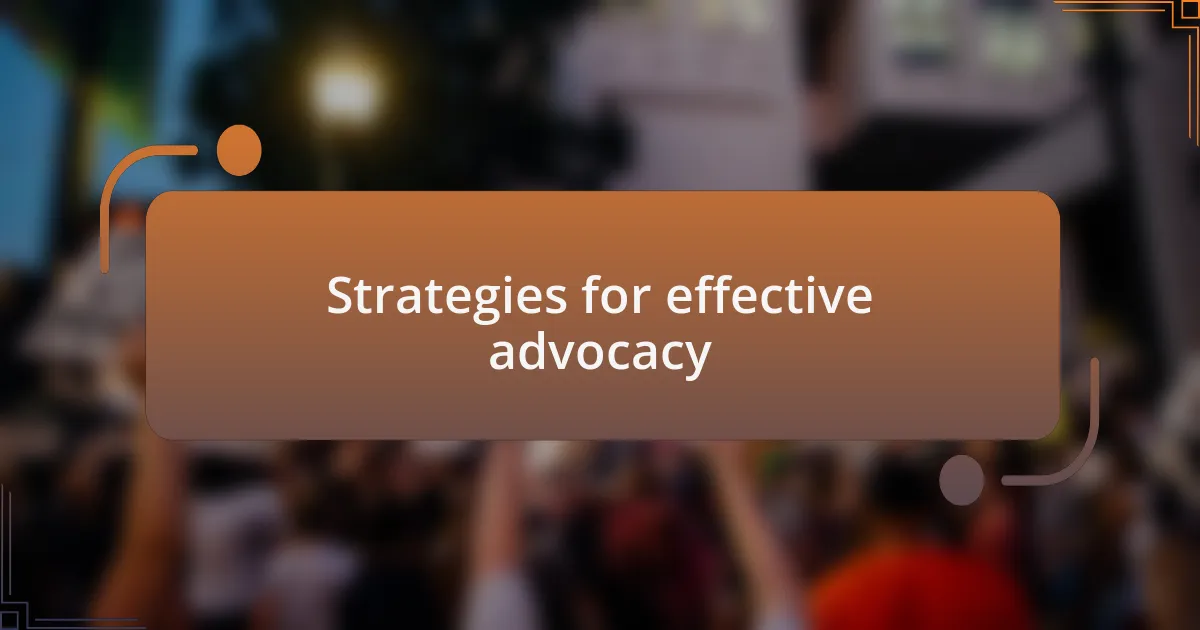
Strategies for effective advocacy
To navigate the complexities of advocacy, building authentic relationships is crucial. I recall a local initiative where I partnered with other community groups, resulting in a stronger voice for our shared cause. By fostering connections, we were able to amplify our messages and create a unified front, proving that collaboration often yields greater impact than solitary efforts.
Moreover, understanding the audience is key to tailoring messages that resonate. During a town hall meeting, I adjusted my presentation based on the concerns expressed by attendees, focusing on personal stories that highlighted the human aspect of our cause. This experience underscored the value of empathy—how can we expect others to listen if we don’t first seek to understand their perspectives?
Lastly, leveraging social media as a tool for advocacy can create waves of support and awareness. I remember launching a campaign that utilized storytelling to convey the experiences of those affected by restrictive laws. Not only did it draw attention, but it also engaged a wider audience in meaningful dialogue. How effective would it be if we embraced new platforms to disseminate our messages and foster community engagement?
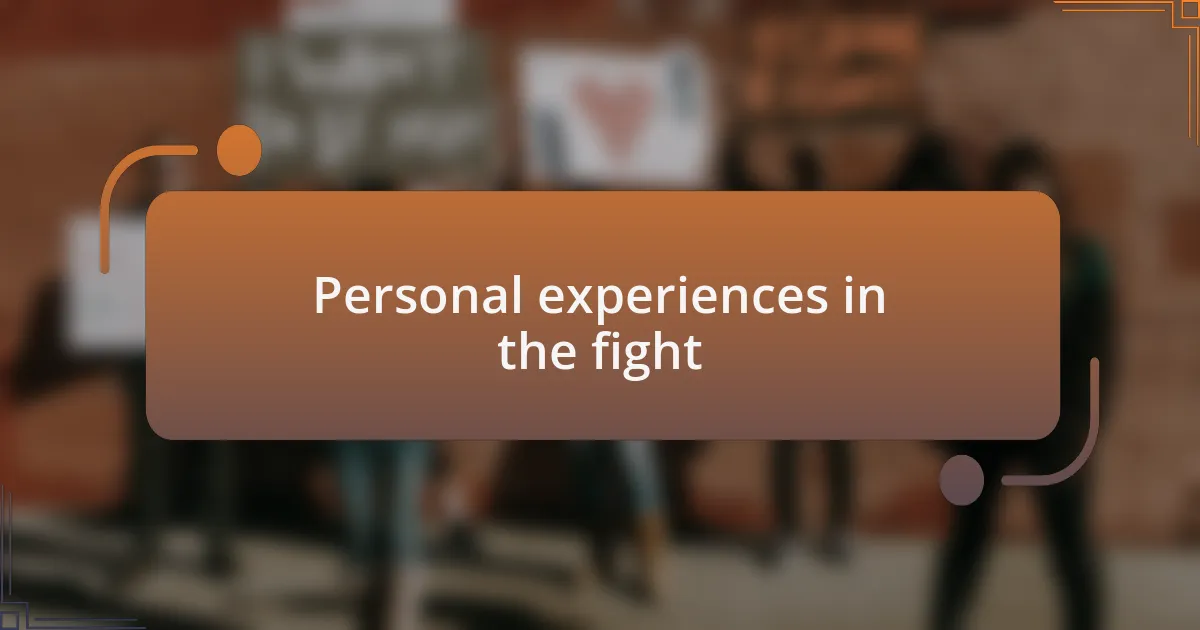
Personal experiences in the fight
The personal journey I’ve experienced in this fight against restrictive laws has been both challenging and illuminating. At a rally, I shared my story about navigating the complexities of pregnancy decisions, and the emotional weight of knowing others faced similar struggles. I felt an undeniable connection with those around me, reminding me that we are part of a larger tapestry woven by shared experiences and profound empathy.
I vividly recall a moment when I met a woman who had been directly impacted by restrictive legislation. Her tears as she recounted her experience shined a light on the human cost of such laws. In that moment, I realized that sharing these personal narratives can be a powerful tool for advocacy. Can you imagine how different the conversation would be if lawmakers heard these stories firsthand? It’s this kind of emotional resonance that can shift perspectives and drive real change.
Advocacy is not just about facts and figures; it’s about the emotional truths that resonate deeply with us. One time, after a legislative hearing, I approached a lawmaker with my own story, hoping to draw a connection. The look on their face as I spoke was poignant; it was as if the walls of policy melted away, and for just a moment, the person behind the title emerged. This experience taught me that personal connections can often transcend ideological boundaries, leaving a lasting impact on those with the power to enact change.
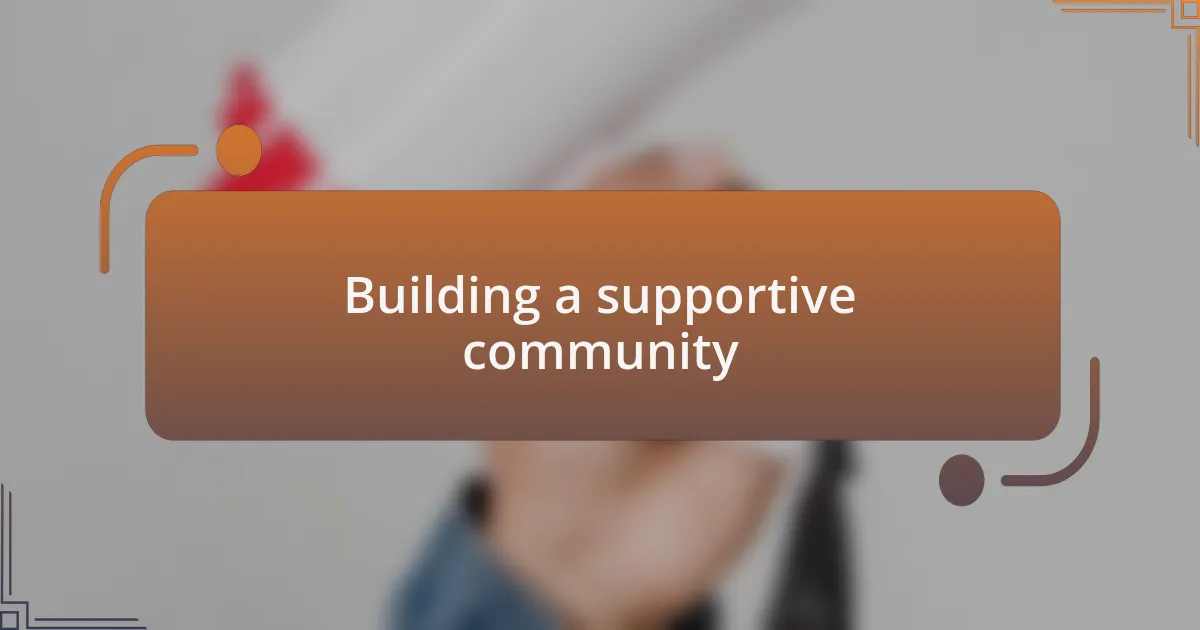
Building a supportive community
Creating a supportive community is crucial for anyone navigating the trials of restrictive laws. I remember attending a local support group where women shared their stories and offered each other encouragement. It was incredible to witness how, in just an hour, strangers became allies, providing strength and understanding that lifted each other up.
One striking moment for me was when a young girl timidly spoke up about her fears concerning her own future. You could feel the room pause, wrapping her in a safety net of empathy and shared experience. How powerful is it when individuals unite not just in their beliefs but in their vulnerabilities? This communal support makes the fight feel a little less daunting, reminding us that we are never truly alone.
Moreover, building such a community allows us to share resources and strategies that can effectively counteract laws we find unjust. I recall a discussion where we brainstormed together, each contributing insights from our unique perspectives. This collaborative spirit not only enriched our understanding but sparked a sense of hope that collective action could manifest real change. Isn’t it inspiring to think of what we can achieve when we come together?
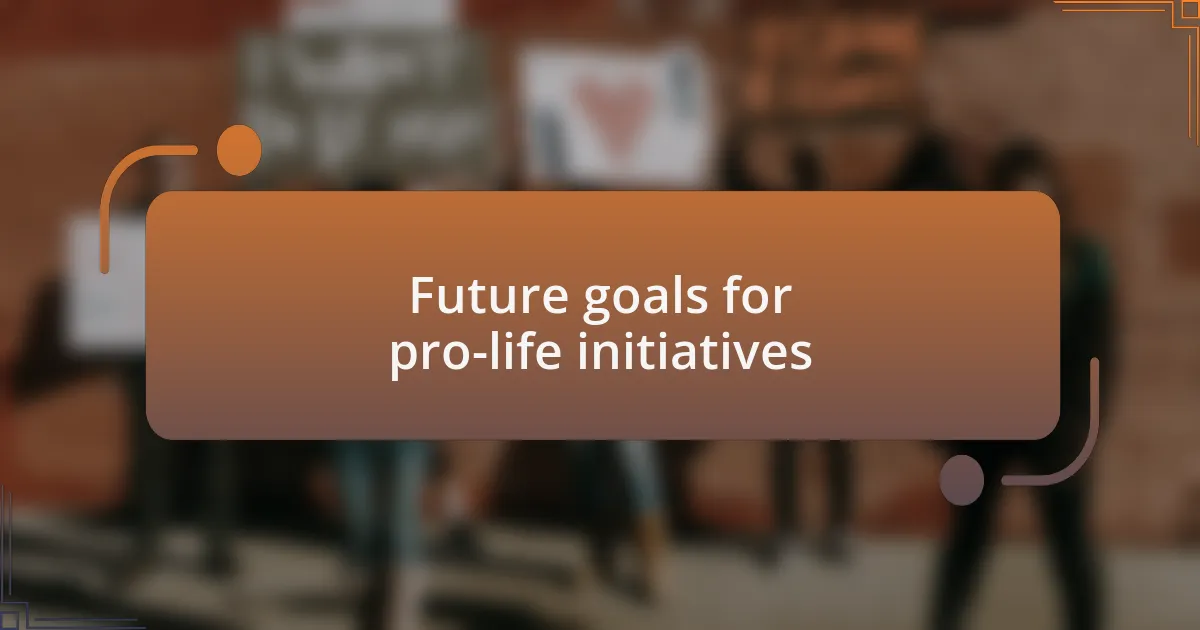
Future goals for pro-life initiatives
Future goals for pro-life initiatives should focus on legislative advocacy, aiming to introduce laws that protect the rights of the unborn while also providing resources for expectant mothers. I think about the importance of pushing for policies that offer financial and emotional support to women in crisis pregnancies. Isn’t it inspiring to envision a future where every woman feels empowered and supported rather than alone in her choice?
Education and awareness are also vital components of our future objectives. By hosting workshops and engaging with communities, we can share the full spectrum of pregnancy options. I once participated in an outreach event where we provided accurate information alongside personal testimonies. The conversations sparked afterward were powerful, highlighting how knowledge can foster understanding. What if, through education, we could change hearts and minds, striking at the very core of restrictive beliefs?
Finally, creating partnerships with like-minded organizations can amplify our efforts significantly. I vividly remember collaborating with a local charity focused on maternal health. Together, we organized an event that not only raised funds but also drew attention to resources available for women. The energy in the room was palpable, filled with hope and a shared commitment to expanding pro-life initiatives. How much more could we accomplish if we unified our voices and resources?